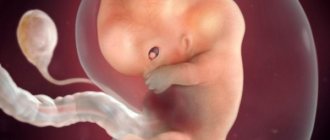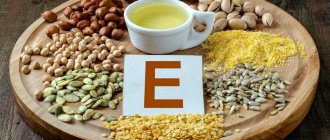Obstetrician-gynecologist, specialist in proper nutrition during pregnancy E.K. Ermolaeva
Everything that an anatomical atlas knows about a woman, everything about her is magical. If only she remembers how insidious sweet buns can be.
Slava Se
NUTRITION during pregnancy is the BASIS OF A woman’s BEAUTY during pregnancy and after childbirth and the HEALTHY development of a CHILD.
Food during pregnancy and vitamins during pregnancy are the BASIS FOR FORMATION of the baby’s brain and body.
Numerous observations of scientists and attentive parents have noted that consumption of PORK MEAT leads to the formation of active, aggressive, assertive children; the predominance of VEAL and beef in food leads to the formation of soft, kind, somewhat passive children; Eating GOAT MEAT creates a child who is balanced and harmonious in terms of character...
What to eat during pregnancy? How to EAT CORRECTLY during pregnancy?
“Eating for two” is an old-fashioned concept that many women understand only in relation to increasing the amount of food they consume. A pregnant woman only needs an extra 300 calories per day for her fetus.
During pregnancy, it is very important to eat OFTEN (6-8-10 times a day), IN SMALL PORTIONS, consuming healthy, nutritious food, since the child develops continuously 24 hours a day and needs constant nutrition. DON'T OVEREAT!
“Eating for two” means “EATING WITH THE SECOND THOUGHT”, taking into account the child’s need for plastic (“building”) material, vitamins and microelements, i.e. Eat a varied and high-quality diet during pregnancy.
If you gain weight (weight) quickly and a lot, it means you are consuming excess amounts or high-calorie foods.
- Recommendations for proper nutrition during pregnancy
- How to have a snack?
- Vitamins during pregnancy
- Calcium
- Folic acid
- Salt
- Iron
- Alternative to caffeine
- Sugar substitutes
- Determining acceptable weight gain during pregnancy
Recommendations for proper nutrition during pregnancy
Nutrition during pregnancy (what to eat during pregnancy, food during pregnancy)
- Drink 100-200 ml of melt water at room temperature every morning on an empty stomach.
- PROPER NUTRITION during pregnancy: protein foods, milk and fermented milk products, cereals (except semolina) and grain bread, vitamin-rich fruits and vegetables, freshly squeezed vegetable and fruit juices (except grape).
- WHAT NOT to eat during pregnancy? Proper nutrition during pregnancy means excluding from the diet smoked, fried, high-calorie and low-nutritive foods, semolina porridge, reconstituted juices, carbonated and caffeinated drinks, exotic and early-season vegetables, fruits and berries.
- Proper nutrition during pregnancy includes boiled, baked, stewed foods.
- During pregnancy, LIMIT your consumption of spicy foods and condiments (ketchups, sauces, mayonnaise, etc.). Eating spicy foods and seasonings increases appetite.
- SWEET during PREGNANCY. It is advisable to limit sweets during pregnancy to natural and dried fruits as much as possible. During pregnancy, it is preferable to consume sweets in the form of complex carbohydrates: apples, carrots, bananas, pears. It is advisable to exclude grapes and watermelon.
- When cooking, PREFERABLY use vegetable oils.
- Consume sufficient fluids with LIQUID RESTRICTION after 18 hours to prevent swelling.
- It is important to discuss which vitamins you should take during pregnancy with your obstetrician-gynecologist. Take vitamins and nutritional supplements as recommended by your doctor.
At the Women's Health Resort Clinic, we see a good obstetrician-gynecologist who specializes in proper NUTRITION during pregnancy.
Our NUTRITION SPECIALIST during pregnancy WILL SELECT for you the necessary vitamins during pregnancy, HEALTHY PRODUCTS that will prevent you and your baby from gaining excess weight during pregnancy; in the case when a pregnant woman does not gain weight - restore the necessary weight gain during pregnancy, eliminate excess weight during pregnancy, create a menu for pregnant women with excess weight and low weight during pregnancy, and help organize tasty and NOT HUNGRY MEALS during the trimesters of pregnancy.
In addition, our experienced specialist in nutrition during pregnancy will CALCULATE for you how much a pregnant woman should weigh, the proper weight gain during pregnancy week by week and the possibility of eating SWEETS during pregnancy that is safe for your figure.
Our nutrition specialist will tell you in detail WHAT NOT TO EAT during pregnancy and how to balance foods that are prohibited by public opinion during pregnancy. But the ones you really want!!!
Based on foreign and Russian experience, we have DEVELOPED and successfully time-tested a NUTRITION SYSTEM that allows you to select products during pregnancy depending on the INDIVIDUAL characteristics of a pregnant woman: her build, taste preferences, body weight and height, sex of the fetus and external features...
Below is a table that shows the foods you need to consume during pregnancy, at least per day.
OPTIMAL average daily SET OF FOOD during pregnancy (healthy diet during pregnancy), fully meeting the physiological needs of pregnancy in nutrients and energy (Developed by the State Research Institute of Nutrition of the Russian Academy of Medical Sciences, 2006).
| Products | Quantity, g |
| Wheat bread | 120 |
| Rye-wheat bread | 100 |
| Wheat flour | 15 |
| Cereals, legumes, pasta | 60 |
| Potato | 200 |
| Various vegetables, greens | 500 |
| Fresh fruits | 300 |
| Fruit juice | 150 |
| Dry fruits | 20 |
| Sugar | 60 |
| Confectionery | 20 |
| Meat, poultry I category | 170 |
| Fish | 70 |
| Milk, kefir and other fermented milk products 2.5% fat | 500 |
| Cottage cheese 4–9% fat | 50 |
| Sour cream 10% fat | 15 |
| Unsalted butter | 25 |
| Vegetable oil | 15 |
| Dietary egg, pcs. | 1/2 |
| Hard cheese | 15 |
| Tea | 1 |
| Coffee | 3 |
| Iodized salt | 5 |
| Chemical composition of the sets: Proteins, g | 96 |
| incl. animals, g | 60 |
| Fats, g | 90 |
| incl. vegetable, g | 23 |
| Carbohydrates, g | 340 |
| Energy value, kcal | 2556 |
What does it mean to eat poorly?
Incorrectness can be of various types:
- disadvantage (a situation that occurs much more often than is commonly thought)
- incorrect ratio of required components (often)
- poor quality of products (often)
- excess (much less common than the three above)
Necessary nutritional components include:
- squirrels
- carbohydrates
- fats
- vitamins
- minerals (including table salt, iron, magnesium, etc.)
- water.
This is common knowledge, however, read on and you will be surprised how little you actually know about it.
If we talk about quality, then all these components should be of the most natural origin, environmentally friendly and prepared, if possible, with minimal culinary processing (for example, it is better to steam and baked than fried). By the way, the famous Canadian midwife Gloria LeMay gives wonderful advice from one sensible doctor to an expectant mother who is afraid of gaining weight: “You don’t have to worry about weight gain as long as you eat food. By food I mean what is grown on the earth by Mother Nature. Everything you put in your mouth should be as close to its natural state as possible. If it’s a potato, then it’s baked “in its jacket.” If cereals - then dishes prepared by you personally from whole grains. If vegetables are organic and raw. If it’s sweets, then let it be a fresh peach, a piece of melon or half a banana.” The more refined the product, the more processed it is, the more it should be avoided (for example, the difference between French fries fried in refined oil and potatoes baked in their jackets is obvious). Gloria also recommends eating coarse gray sea salt purchased from a good store. It is healthier than purified iodized fine salt, as it is of natural origin and contains many essential microelements in trace quantities.
Now you need to find out all the most important things about each of the above nutritional components.
What to eat during pregnancy? What should you not eat during pregnancy?
During pregnancy, you should NOT snack on high-calorie “empty” foods - chips, kiries, chocolates, cookies, etc. Such foods (sweets during pregnancy) contain high amounts of SUGAR, salt, fat, preservatives, artificial additives and a negligible amount of nutrients.
Eating sweets during pregnancy increases the risk of developing allergic reactions in you and your baby, increases fat “depots” (reserves) and leads to rapid loss of shape.
REPLACE “empty” foods with healthy foods during pregnancy: fresh fruits, vegetables, herbs, muesli, oatmeal cookies, grain crackers made from wheat, corn, rice, popcorn (without butter), small amounts of nuts, yogurt, cottage cheese, cheese , dried fruits (dried apricots, dried prunes, apricots, pears), fresh and frozen fruits, canned fruits in their own juice.
EXCLUDE grapes, raisins, bananas from your diet after 20 weeks - these should not be eaten during pregnancy.
Instead of pastries, pies, baked goods, bake your own HEALTHY DESSERTS: use grain instead of flour; choose oat desserts; add NUTS, dried apricots, DRIED FRUITS to the dough. Use LESS sugar, FAT, give preference to vegetable oils.
Prohibited Products
The following should be excluded from a pregnant woman’s diet:
- raw fish/sushi/rolls;
- raw or insufficiently heat-treated products of animal origin - meat, minced meat, milk, soft cheeses (except those made from pasteurized milk);
- blue cheese;
- homemade canned goods;
- poorly washed fruits and vegetables.
When eating raw fish, the mother's body can become infected with parasites. Their waste products are toxic to the embryo. Remember that even vegetarian sushi and rolls or those containing cooked fish can be dangerous, as they are usually prepared by the same chefs and using the same equipment as those containing raw fish.
Raw animal products may contain pathogenic bacteria. Rare steak or carpaccio should be avoided. When choosing a soft cheese (such as feta), you need to make sure that it is made from pasteurized milk (indicated on the label).
Blue cheeses may contain the bacterium listeria. This bacterium can cause irreparable harm to the baby's health.
Poorly washed fruits can be infected with toxoplasmosis, which is also very dangerous for the life emerging in the womb.
Consumption of home-canned food is fraught with the development of botulism (damage to the nervous system).
Vitamins during pregnancy
Daily requirement for elements of an adult, mg (Skalny A.V., 2000)
| Potassium | 1850 -5500 |
| Sodium | 1100 — 3300 |
| Calcium | 1200 |
| Phosphorus | 1200 |
| Magnesium | 350 — 400 |
| Iron | 18 |
| Zinc | 20 |
| Manganese | 2,5 — 5,0 |
| Copper | 2-3 |
| Chromium | 0,05 — 0,2 |
| Cobalt | 20 |
| Selenium | 0,05 — 0,2 |
| Iodine | 0,2 |
Folic acid
Folic acid (vitamin BC) prevents defects in the development of the child’s spinal cord and brain. A daily intake of 0.08 mg of folic acid is recommended.
Foods rich in folic acid (0.08 mg or more per 100 g) - cereals, yeast, liver, green beans, orange juice, spinach, strawberries, sunflower seeds.
Foods containing moderate amounts of folic acid - 0.04-0.08 mg - broccoli, Brussels sprouts, pumpkin, corn, green peas, oranges, ground nuts, raspberries, salad.
Nutrition in the third trimester
:The calorie content of food should be 2200 kcal per day. We make meals even more fractional - 7-8 meals, small portions. Focus on foods rich in:
- provitamin A (beta-carotenes) - sea buckthorn, rowan, apricots, rose hips, carrots, peaches, celery and spinach
- vitamin C - potatoes, greens, bell peppers, currants, carrots, cabbage
- Vitamin D, 400 IU - sunbathing
Vitamin D deficiency impairs the maternal skeletal system and fetal skeletal formation, but also has a definite effect on chronic susceptibility to disease soon after birth. The list of pathologies that can be caused by a lack of vitamin D is long; the expectant mother needs to provide her body with it, so she will protect both herself and her baby.
Salt
Salt is essential for a woman's health during pregnancy. But its excess intake increases blood pressure and contributes to the appearance of edema. If a pregnancy nutrition specialist recommends reducing the amount of salt you consume, you should:
- lightly salt food;
- do not eat salty foods (canned vegetables, soups, ham, hot dogs, cold cuts, bacon, chips, salted nuts) or salty marinades, mayonnaise;
- do not consume a lot of spices and vegetables that replace salt and add aroma and taste to food: onions, garlic, mushrooms, rosemary, pepper.
Iron
It is very important to increase your iron intake during pregnancy. The daily requirement for iron is 18 mg. It is advisable to consume foods containing iron in large quantities:
- meat by-products (liver, kidneys, tongue), pork, beef, lamb, horse meat, rabbit meat, chicken meat;
- mackerel, horse mackerel, herring, pink salmon, flounder, cod;
- pearl barley, barley, rice, potatoes, eggplants, green peas, carrots, cucumbers, sweet peppers, pumpkin, buckwheat, beans, peas;
- radishes, beets, watermelon, melon, plum, cherry, strawberry, pomegranate, black currant, raspberry, plum, peaches, lemons, oranges, tangerines;
- milk, cheese, kefir, sour cream, cottage cheese.
Vitamin C helps your body absorb iron—MAKE SURE to eat at least 1 fruit or vegetable that contains vitamin C.
Healthy food plate
The main meal should include:
- 1 serving of protein product (meat, fish)
- 1 serving of starchy food (pasta, potatoes)
- 2 servings of vegetables + 1 fruit + 1-2 servings of dairy products
Today it is believed that there should be no special diet to prevent the development of food allergies in a child. On the contrary, it has been proven that artificial avoidance of certain foods can provoke the paradoxical development of an allergy in a baby to this particular product, because he was not introduced to it while in his mother’s tummy. The diet should be as varied and complete as possible.
Alternative to caffeine
At the moment, the effects that caffeine-containing products have on the developing fetus are not fully understood. These products include coffee, Coca-Cola, Pepsi, tea, and chocolate.
There is an assumption that caffeine has a negative effect on the child’s nervous system much more than on a pregnant woman. The reason is that the fetal systems and organs are still immature and can be damaged by consuming caffeine-containing products.
Instead of caffeinated drinks, it is advisable to consume ANY SUBSTITUTES for decaffeinated coffee; fruit teas; freshly squeezed juices or juice drinks based on natural juice; soups, broths; milk; water, mineral water.
The caffeine content in a cup of coffee is 146 mg, in Coca-Cola - 65 mg, in tea - 46 mg.
What should be limited/excluded?
- All types of alcoholic drinks
- Limit caffeine to 200 mg per day (roughly equivalent to 1-2 coffees per day)
- Herbal teas - with caution
- Salt and salty foods (2-3 trimester)
- Canned food
- Synthetic food colors and fast food
Given the increased need for vitamins and minerals, pregnant women should take vitamin and mineral complexes. Unfortunately, their content in natural products is insufficient, especially in the winter and spring. Specialized products have an advantage over vitamin-mineral complexes, since they contain an optimal set of nutrients, vitamins, macro- and microelements.
(36 ratings; article rating 3.9)
Share Share Share
Leading specialists in the management of complex pregnancies in the Southern Federal District
Ermolaeva Elvira Kadirovna is a well-known and recognized specialist in the North Caucasus in the field of diagnosis and treatment of miscarriage, miscarriage, recurrent miscarriage, management of pregnant women with thrombophilia, antiphospholipid syndrome (APS), systemic lupus erythematosus (SLE), uterine fibroids, management of pregnancy in young and older pregnant women (after 38 years), management of capricious pregnant women, management of pregnant women with excess body weight. A good obstetrician-gynecologist, a specialist in rational nutrition during pregnancy, a physiotherapist-resortologist, an experienced ultrasound doctor. Those who want to maintain their figure and successfully carry woman's pregnancy.
Ermolaev Oleg Yurievich Candidate of Medical Sciences, gynecologist-endocrinologist with 25 years of experience and successful experience in managing pregnancy in women with uterine prolapse, bicornuate uterus, saddle uterus and other malformations of the genital organs, managing pregnant women with livedo, thrombophilia and antiphospholipid syndrome (APS) , polycystic ovary syndrome. Management of multiple pregnancies, which require special attention and experience from doctors. Management of pregnancy after IVF, ICSI, after artificial insemination. Management of pregnant women with placental insufficiency. Management of pregnancy against the background of an IUD.
About the doctors of the Clinic in detail...
INTERNATIONAL RECOGNITION of the reputation and achievements of the Women's Health Resort Clinic in the development and implementation of effective and safe treatment methods and the quality of medical services provided is the AWARDING of the Women's Health Resort Clinic in Pyatigorsk with the SIQS International QUALITY CERTIFICATE in the field of medicine and healthcare. International Socratic Committee, Oxford, UK and Swiss Institute for Quality Standards, Zurich, SWITZERLAND. Read more…
We work seven days a week and on holidays:
Monday - Friday from 8.00 to 20.00, Saturday - Sunday from 8.00 to 17.00.
Appointment with an obstetrician-gynecologist who specializes in nutrition during pregnancy, fetal ultrasound, screening during pregnancy by appointment by multi-channel telephone (calls within Russia are free), or +7 (928) 022-05-32 (for foreign calls).
ONLINE gynecologist in Pyatigorsk can be found at
BOOK ONLINE for an appointment with a gynecologist in Pyatigorsk here.
With mutual respect for the religion and various habits of our patients, we achieve SUCCESSFUL pregnancy and the birth of healthy, strong, balanced and open-minded children. TO THE JOY of parents and people around you!
We are at your complete disposal if you have any doubts or wishes.
Questions and answers
Question: WHERE DO I see a pregnancy nutrition specialist? A.Sh., Nalchik. Answer: A specialist in proper nutrition during pregnancy is available at the Women's Health Clinic in Pyatigorsk.
Question: How to properly organize NUTRITION during PREGNANCY in order to maintain health plus weight during pregnancy? Answer: An EXPERIENCED SPECIALIST in proper nutrition during pregnancy will help you maintain health and proper weight gain during pregnancy. A nutrition specialist during pregnancy is available at the Pyatigorsk Pregnancy Clinic by appointment by phone. 8 (calls within Russia are free), or (for foreign calls), or
Question: What VITAMINS can be taken safely during PREGNANCY? Z.Kh., Grozny. Answer: The question of which vitamins to take during pregnancy is decided by an obstetrician-gynecologist based on the health status of the pregnant woman and an analysis of the nutritional characteristics of a particular woman during pregnancy. At the Women's Health Clinic in Pyatigorsk, a specialist in proper nutrition during pregnancy is seeing you. Together with you, a specialist in proper nutrition during pregnancy will select what vitamins to take during pregnancy, what to eat during pregnancy, HOW MUCH SWEET you can eat during pregnancy, and will develop for you how to eat during pregnancy and organize nutrition according to the trimesters of pregnancy, explain in detail what you should not eat during pregnancy. pregnancy and how to PRESERVE a beautiful FIGURE and attractive appearance during pregnancy.
Question: Does the pregnancy nutrition specialist meet on SUNDAY? M.E., Baksan. Answer: A specialist in proper nutrition during pregnancy is available daily, 7 days a week, make an appointment by calling 8 (800) 500-52-74 (toll-free within Russia), or +7 (for international calls), or at the same time you can get a consultation with an obstetrician -gynecologist plus ultrasound during pregnancy, screening during pregnancy.
Question: Does a specialist in proper nutrition during pregnancy accept HOLIDAYS? E.K., Krasnodar. Answer: A specialist in rational nutrition during pregnancy in Pyatigorsk accepts DAILY and on holidays, appointment by phone. 8 (800) 500-52-74 (calls within Russia are free), or +7 (for foreign calls), or
Question: Can I take vitamin E during pregnancy? L.N., Rostov-on-Don. Answer: Vitamin E during pregnancy is necessary for the proper growth and development of the fetus. The required amount of vitamin E during pregnancy is at least 30 IU, according to the State Research Institute of Nutrition of the Russian Academy of Medical Sciences - 90-120 IU.
Question: Who can create a MENU FOR PREGNANT WOMEN who is overweight? P.K., Cherkessk. Answer: A specialist in proper nutrition during pregnancy at the Women's Health Resort Clinic in Pyatigorsk will help you eliminate excess weight during pregnancy and develop a diet for pregnant women with excess weight, organize tasty and non-starving MEALS during the TRIMESTERS of pregnancy.
Question: My pregnancy weight is LOW. How to achieve a normal weight for a pregnant woman and organize proper weight gain during pregnancy week by week? Zh.F., Makhachkala. Answer: Our specialist in proper nutrition during pregnancy, experienced obstetrician-gynecologist E.K., will help to achieve correct weight gain in a pregnant woman week by week and a normal weight for the pregnant woman. Ermolaeva.
Question: Where is the BEST pregnancy nutrition specialist? G.L., Moscow. Answer: According to numerous reviews from satisfied women, the best specialist in proper nutrition during pregnancy is seen at the Pregnancy Clinic in Pyatigorsk.
Question: Can excess weight in a pregnant woman be eliminated without pills through nutrition? V.E., Essentuki. Answer: Excess weight during pregnancy can be corrected without the use of medications with proper nutrition.
Question: WEIGHT CHART during pregnancy? Answer: The pregnancy weight chart is here.
Question: Who can create a competent and TASTY MENU for overweight pregnant women? E.Zh., Baku. Answer: An experienced specialist in proper nutrition during pregnancy, E.K., will help you create a balanced and non-starvation menu for pregnant women who are overweight. Ermolaeva. Appointment with a specialist in proper nutrition during pregnancy by appointment by phone. 8 (800) 500-52-74 (calls within Russia are free), or +7 (for foreign calls), or
Question: Tell us how to get pregnancy care at your famous Women's Health Clinic under your policy? What is needed for this: a consultation with an obstetrician-gynecologist at your Clinic, or a referral from my local gynecologist, or is just a desire and an insurance policy enough? Answer: You should contact your insurance company to obtain a cover letter. If you have a cover letter, you will be able to conduct the necessary examination, consultation with an obstetrician-gynecologist and further management of the pregnancy in our Clinic. When visiting an obstetrician-gynecologist, you must have your passport and insurance policy with you. Sincerely, Chief Accountant of the Women's Health Resort Clinic.
Question: Is it possible to issue a sick leave certificate at the Clinic for the period of pregnancy treatment? Answer: At the Women's Health Resort Clinic, sick leave (sick leave) is not issued.
Question: Do you provide documents to obtain a tax deduction for pregnancy? Answer: The resort women's health clinic provides documents to obtain a tax deduction for pregnancy care (13% tax refund).
Subsections
- Pregnancy management
- Cost of pregnancy counseling
- Screening during pregnancy
- Examination of pregnant women for congenital malformations of the fetus
- Comprehensive assessment of pregnancy markers
- Ultrasound of pregnancy
- Development of pregnancy by week
- Critical periods of embryonic development
- Possible problems during pregnancy
- Proper nutrition during pregnancy
- Hygiene for a pregnant woman
- Sleeping during pregnancy
- Risk factors (caution for pregnant women)
- Determining acceptable weight gain during pregnancy
- Determining your child's date of birth
- Assessment of fetal movement activity
- Sexual life during pregnancy
- Breathing and relaxation techniques during childbirth
- Literature for preparing for childbirth and raising children
- Premature birth, threatened miscarriage
- The first days after childbirth
- Program No. 7. Postpartum rehabilitation and VUM-building
- Program No. 16. How to remove belly fat
- Breastfeeding or bottle feeding?
- Breastfeeding: problems and rules
- Swaddling a baby
- Let's go to the maternity hospital! Things for mom and baby
- Measuring basal temperature and maintaining a graph
- Teeth and pregnancy
- Our mothers
- School of Natural Motherhood
- Questions and answers about pregnancy
- Reviews about pregnancy management in our Clinic
Attention: squirrels!
We will start with proteins, because, as we will see later, it is with disorders of protein metabolism, with protein deficiency that the majority of the complications that were mentioned at the beginning are associated. Below you will see why.
Here's what proteins provide during pregnancy:
- growth and development of the baby, placenta, uterus and mammary glands of the mother (constructive role), as well as reserves that will be used during breastfeeding
- transport of nutrients, vitamins, microelements (including iron), calcium (transport role)
- immune protection, since antibodies against bacteria and viruses are proteins (protective role)
- optimal functioning of the coagulation and anticoagulation systems (no bleeding or blood clots occur) (from 4-5 months of pregnancy the content of fibrinogen, prothrombin, blood coagulation factors V, VII, VIII, X increases - all these are proteins)
- maintaining plasma osmotic pressure; this is a property that does not allow the liquid part of the blood to leave the vascular bed, thereby preventing the occurrence of edema and blood thickening; at normal osmotic pressure of plasma, the blood volume is sufficient to provide nutrition and respiration for both mother and child, and the fluidity of the blood ensures the best blood supply; Proteins albumin and sodium chloride, that is, table salt, are responsible for this most important quality.
It is easy to understand what protein metabolism in the body depends on:
- from protein intake from food
- from digestion and absorption in the gastrointestinal tract (mainly in the stomach and small intestine)
- on the function of the liver (it is it that produces the main necessary proteins - construction, protective, necessary for coagulation)
- on the intensity of breakdown and loss of proteins (this applies to increased physical activity and some kidney diseases).
Here's how protein deficiency manifests itself during pregnancy:
- the earliest signs are insufficient weight gain and an increase in hemoglobin (HGB) and hematocrit (Ht); Please note - a high hemoglobin level (above 120 g/l) in the second and third trimester is a reason not to be happy, but to be wary, since it usually indicates blood thickening as a result of a lack of protein and a decrease in circulating blood volume
- delayed intrauterine development of the child (according to measurements of the height of the uterine fundus and abdominal circumference, as well as ultrasound), its malnutrition
- the appearance of edema (due to a drop in plasma osmotic pressure, the liquid part of the blood leaves the vessels into the tissues)
- increased blood pressure (this is a “reaction of despair” - due to a decrease in the volume of circulating blood, the body is forced to reduce the lumen of blood vessels and increase the pressure in them so that the remaining blood circulates more intensely)
- an increase in liver enzymes, indicating liver suffering due to protein starvation
- preeclampsia and eclampsia (expressed in headaches, increased reflexes, blurred vision and, finally, convulsions) are the most dangerous complications of gestosis, requiring urgent hospitalization
(For reference: the normal level of total serum protein is 65-85 g/l, a decrease to 60 g/l already indicates severe gestosis; serum albumin is normally 35-55 g/l, when it decreases to 30 g/l l edema develops; normal hematocrit is 0.36 - 0.42 l/l; weight gain of 2.3 - 4.5 kg over the period from 24 to 28 weeks is normal and indicates an adequate increase in circulating blood volume).









